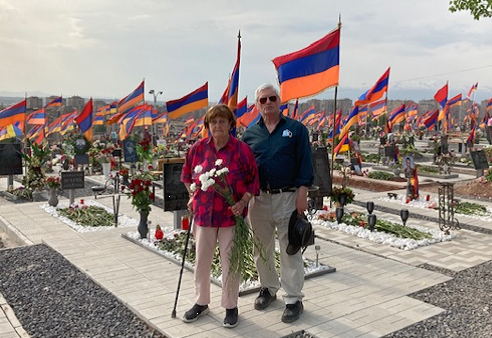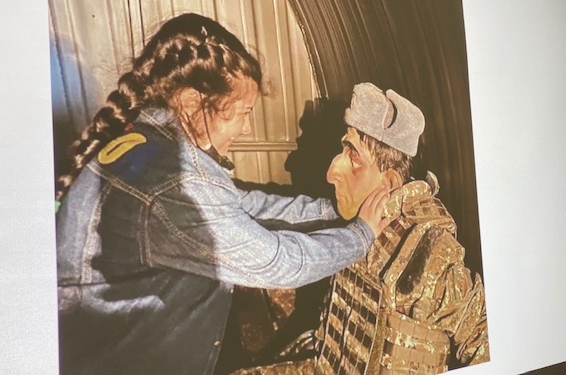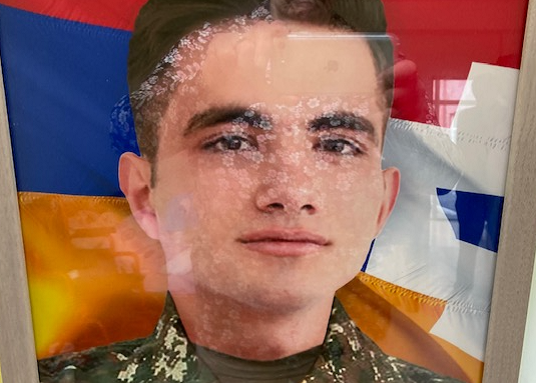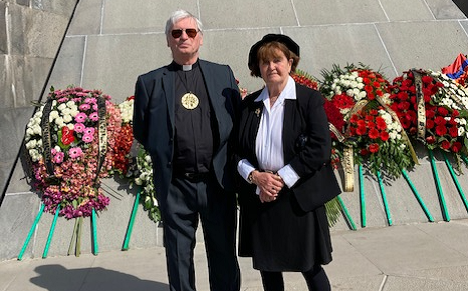Caroline Cox and David Thomas paying respect to those killed in the 44-day war. The ‘sea of flags’ placed on each grave spread far beyond this photograph – and also in Artsakh and other towns and villages: a powerfully tragic representation of the loss of life incurred.
BARONESS COX AND REVD. DAVID THOMAS, APRIL 2021.
Humanitarian Aid Relief Trust.
Azerbaijan and Turkey’s recent 44 day invasion of Nagorno Karabakh (Artsakh) last autumn resulted in thousands of deaths, massive destruction and widespread displacement.
During this visit to Armenia in April, it was our painful privilege to meet refugees who fled from Artsakh to Yerevan, wounded soldiers, civilian survivors and the families of missing persons.
Everyone whom we met described the recent war in Karabakh and its aftermath as part of a long and ongoing process of genocide. Their concerns are shared by many others, including the human rights group Genocide Watch, who issued a Genocide Emergency Alert following the invasion, and the International Association of Genocide Scholars, who warned in October:
“…history, from the Armenian genocide to the last three decades of conflict, as well as
current political statements, economic policies, sentiments of the societies and military
actions by the Azerbaijani and Turkish leadership should warn us that genocide of the
Armenians in Nagorno-Karabakh, and perhaps even Armenia, is a very real
possibility… We appeal to the international community to raise their voices against
xenophobia, aggression, and war, and for the prevention of new genocide.”
At least four urgent concerns remain despite the ceasefire in November:
- Azerbaijan’s continuing refusal to release prisoners, despite a commitment to do so in the ceasefire agreement;
- Escalating anti-Armenian hatred, including the opening of a ‘Victory Park’ in Baku;
- Reports of further Azerbaijani military offensives;
- Destruction of sites of Armenian culture and history.
- Continuing detention of Armenian prisoners and desecration of corpses
Armenian prisoners of war (POWs) and civilian detainees remain vulnerable to killings,
torture, indefinite imprisonment or enslavement, with reports of humiliating treatment and
desecration of corpses by Azerbaijani soldiers, in actions captured on videos and widely
circulated on social media.
By February 2021, Armenia had asked the European Court of Human Rights to intervene in
240 cases regarding POWs and civilian detainees. In 90 per cent of those cases, there is photo and/or video evidence confirming that these people were in Azerbaijani custody; the rest of the cases rely on witness accounts.
We witnessed widespread and acute grief among those who have lost loved ones, or whose relatives are known to be held captive in Azerbaijan.
- Escalating anti-Armenian hatred, including the opening of a ‘Victory Park’ in Baku
Cases of anti-Armenian rhetoric, or ‘Armenophobia’, continue to rise among Azerbaijani state officials, state-dominated media outlets, non-state public figures and across social media.
The Azerbaijani President Ilham Aliyev, for example, regularly incites hatred in public
statements. Some examples:
‘Azerbaijan soldiers expel them like dogs’.
‘We will continue to expel these (Armenian) liars. They have neither conscience nor morality. They don’t even have the brain’.
‘We must not and will not forget about our historic lands. This must determine our future activity, and we are already working in that direction. Our historic lands are the Yerevan Khanate, Zangezur, Geycha (Lake Sevan). Both the young generation and the world should know about this.’
‘Yerevan (the historic capital city of Armenia) is our historic land we, the Azerbaijanis, will go back to these historical lands. It is our political and strategic goal, and we gradually reach it.’
He also refers to Armenia as a “country of no value” and to Armenians as “savages”,
“barbarians” and “dogs”.
In April 2021, President Aliyev opened a Spoils of War Park in Baku to commemorate the recent war. The park also displays mocking, humiliating mannequins of Armenian soldiers – and children are encouraged to hit them or abuse them in other ways.
President Aliyev walks through a corridor of killed Armenian soldiers’ helmets at the Spoils of War Park.
Children too are exposed to and taught Armenophobia, including mocking caricatures of Armenian soldiers. Source: photos shown in a presentation by the Armenian Human Rights Ombudsman about the Spoils of War Park in Baku.
- Reports of further Azerbaijani military offensives
President Aliyev recently praised his troops for completing “their glorious mission” in Nagorno Karabakh to liberate “our native lands from occupiers”:
“…We took timely steps, mobilised all our resources, created an iron fist and crushed
the enemy’s head… If Armenian fascism ever raises its head again, the result will be
the same. Again, Azerbaijan’s iron fist will break their back.”
His avowed commitment to ‘liberate lands’ and ‘crush the enemy’s head’ are doubly alarming and should not be allowed to continue with impunity.
During our visit, we heard reports of breaches to the November ceasefire agreement, with
Azerbaijani forces advancing into new positions and demanding the handover of villages in
Karabakh – in at least one incident, they were held back by Russian peacekeepers.
We also heard reports of armed units creeping into locations within sovereign territories of the Republic of Armenia, and rumours of plans to create a corridor through Armenia to connect Turkey and Azerbaijan. While these are rumours, they are causing great concern for the Armenian people, especially in view of the act that Azerbaijan has been granted impunity for the numerous war crimes and crimes against humanity which are well recorded.
Spartan Altunyan, a patient from the Lady Cox Rehabilitation Centre in Karabakh, told us: “When the recent war started, I didn’t want to leave my village. It was my home. But my brothers insisted that I should leave because the enemy was very close. My village is now occupied by Azerbaijan.”
One of Spartan’s brothers (pictured) was killed in the war, aged 19.
- Annihilation of Armenian culture and history
Serious concerns remain over the fate of hundreds of Armenian Christian monuments and
cultural heritage sites, which are now under Azerbaijan’s control. The sites include 161
churches, the ancient city of Tigranakert, Azokh Paleolithic Cave and the Nor Karmiravan
tombs.
In a BBC report ‘the mystery of the missing church’, Azerbaijani troops are seen celebrating the capture of the town of Jabrayil from the bell tower of the local church. Correspondent Jonah Fisher visited the site after the 44-day war and the church was no longer there. Photos taken in 2017 and 2021 (Source: BBC)
On 20 November, UNESCO proposed to undertake an independent mission to draw a preliminary inventory of significant cultural properties, as a first step towards safeguarding the region’s heritage. We understand that UNESCO is still waiting for a response from Azerbaijan in order to proceed with its mission.
A report published in January 2020 by Karabakh’s Human Rights Ombudsman lists a number
of cultural and religious sites that were targeted or damaged during or since the recent war,
including:
- Ghazanchetsots Cathedral in Shushi;
- St. John the Baptist Church in Shushi;
- An archaeological camp near Tigranakert;
- A memorial dedicated to the victims of the previous war;
- Armenian tombstones;
- A cross-stone in Ishkhan village in Hadrout;
- A cross standing in the middle of Sanasar town in memory of the martyrs of the
previous war;
- A cross-monument at St. Mariam Astvatsatsin church; cultural monuments in Talish
village;
- The cross-stone near Katarovank monastery;
- The statues of Sparapet Vazgen Sargsyan and Garegin Nzhdeh.
Solemn Remembrance on 24 April, Armenian Genocide Remembrance Day.
Between 1915-23, an estimated 1.5 million Armenians were killed in the declining Ottoman Empire and surrounding areas.
Many countries do recognise the Genocide but many do not (including the United Kingdom, – although Wales does and exhibits a memorial in Peace Park in Cardiff).
It was a source of great comfort to the Armenian people when, on April 24th 2021, President Biden made an announcement that the USA does now fully recognise the Armenian Genocide.
April 24th is the day when there is an annual formal commemoration of the Genocide held at the site of the Genocide Memorial in Yerevan.
All of those whom we met expressed dismay and anger at the lack of meaningful support from the UK Government and the wider international community.
Conclusions.
Their urgent priorities:
- The mistreatment of Armenian POWs and civilian detainees by Azerbaijani forces,
including humiliating treatment and desecration of corpses, are war crimes. Detainees
should be released and repatriated without further delay. Perpetrators must be
brought to justice.
- It is essential that UNESCO honours its proposal made in November to send an
independent mission to investigate all Armenian cultural and religious sites to
ensure their physical preservation and to guarantee the rights of Armenian clergy and
religious communities to continue to run them and live in them.
- There is an urgent need to end the impunity with which Azerbaijan, supported by
Turkey, has carried out such systematic, wide-ranging and brutal violations of
human rights. To date, neither state has been held to account for its actions by the
international community, despite clear evidence of recent and ongoing atrocities.
- Given the intensity of the recent war and the complete lack of protection for civilians,
states involved in the mediation process must work doubly-hard to devise sufficient
measures to ensure that Azerbaijan and Turkey begin fully to uphold the ceasefire.
- For all states, including the UK Government, to acknowledge as an act of genocide
the mass murder of Armenians carried out in the Ottoman Empire from 1915-23;
and to apply diplomatic pressure on the Turkish Government to acknowledge the
actions of its predecessors.
It has been well said that the failure to acknowledge and condemn a genocide encourages the perpetration of further genocides. It is deeply disturbing to see that Azerbaijan may be pursuing such perpetration with impunity.
‘We will never forget’: David and Caroline at the Armenian Genocide Memorial.







